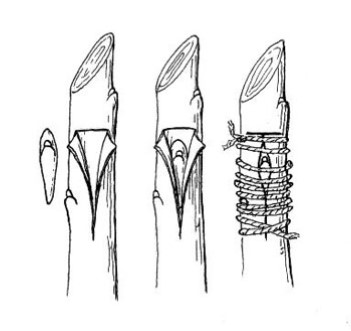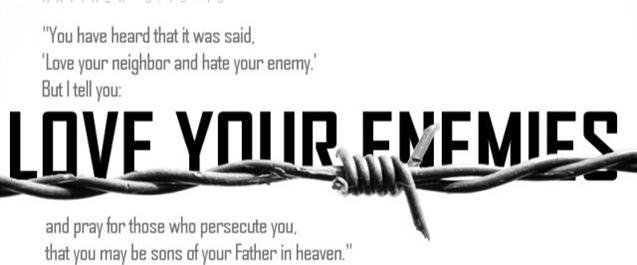Advent: Praying for a Sword Day! By Phil Tiews
/… the king sprang suddenly erect. Tall and proud he seemed again; and rising in his stirrups he cried in a loud voice, more clear than any there had heard a mortal man achieve before:
Arise, arise Riders of Théoden!
Fell deeds awake: fire and slaughter!
Spear shall be shaken, shield be splintered,
A sword-day, a red day, ere the sun rises!
Ride now, ride now! Ride to Gondor!
Suddenly the king cried to Snowmane and the horse sprang away. Behind him his banner blew in the wind, white horse upon a field of green, but he outpaced it. After him thundered the knights of his house, but he was ever before them… For morning came, morning and a wind from the sea; and darkness was removed, and the hosts of Mordor wailed, and terror took them, and they fled, and died, and the hoofs of wrath rode over them.
This passage from J.R.R Tolkien’s Lord of the Rings trilogy might seem out of place as we approach Christmas, but over the years it has come back powerfully to me as I pray during Advent. In Advent we are asking for the King to come, and the Bible makes it very clear that when He comes a second time it will be very different than His first coming:
Now I saw heaven opened, and behold, a white horse. And He who sat on him was called Faithful and True, and in righteousness He judges and makes war.
His eyes were like a flame of fire, and on His head were many crowns. He had a name written that no one knew except Himself.
He was clothed with a robe dipped in blood, and His name is called The Word of God.
And the armies in heaven, clothed in fine linen, white and clean, followed Him on white horses.
Now out of His mouth goes a sharp sword, that with it He should strike the nations. And He Himself will rule them with a rod of iron. He Himself treads the winepress of the fierceness and wrath of Almighty God.
And He has on His robe and on His thigh a name written: KING OF KINGS AND LORD OF LORDS. Rev 19:11-16
Sounds a lot like the ride of Théoden! That day will be ‘a sword day, a red day’ and the King of Kings will sweep His enemies before Him. He will establish His Kingdom and there will be none to oppose Him. I think this is why we love stories of rescuers arriving in the nick of time to set people free from the attack of evil. It touches on the Great Story which God has put deep in our hearts, the Hope of the coming of the King to put all things right.
However, as we wait, King Jesus has taught to pray ‘Thy Kingdom come, Thy will be done, on earth as it is in Heaven’. That ‘sword day’ will not come fully and finally until Jesus returns, but right now, every day in small and large ways, incrementally, that day is to be pressed out in the world around us. We are to ask for, expect, and participate in His Kingdom, His rule, His rescue to break in. We are not to hunker underground and await His coming, but to pray and be part of His Kingdom coming daily until the day He comes to finish the job.
As I have prayed and thought on this, I realize that for me to live and believe this way, His Kingdom is going to have to come more in my life, too! I have enemies of fear, of slavery to approval, of unbelief that need to be swept away for me to be a partner is seeing the Lord’s will be done on earth as it is in Heaven. Freeing me to witness boldly, to pray for healing, to work for reconciliation, to address wrongdoing. So this Advent I am praying for the Rider on the White Horse to sweep through my life and rout these enemies so that I can be part of the pressing out of His rule and will now – until the final ‘sword day’.



 Ed. Note: Ned and his family moved here from Minneapolis to be part of the The Word of God for a few years in the 1980’s.
Ed. Note: Ned and his family moved here from Minneapolis to be part of the The Word of God for a few years in the 1980’s.

 You did not choose me, but I chose you and appointed you to go and bear fruit—fruit that will last...
You did not choose me, but I chose you and appointed you to go and bear fruit—fruit that will last...

 We know that Jesus’ last directive to his disciples was ‘Go and make some more’! Whatever else His Body is to be about, it should certainly be making disciples. But most of us, and I include myself here, feel that is is a bit over our head. Yes, SOMEBODY should be making disciples. There must be experts who can be especially devoted to this task, which is good, because we feel inadequate.
The idea of forming a completely mature, fully trained, widely experienced disciple is daunting! But fortunately, that is not the task laid on each of us individually. The challenge of raising up disciples who can raise up other disciples is the calling of the whole Body – together. Each of us have a part to play in this: raising our children, maybe working with just one or two people, or maybe just adding to the grow of a fellow disciple is some small way.
We know that Jesus’ last directive to his disciples was ‘Go and make some more’! Whatever else His Body is to be about, it should certainly be making disciples. But most of us, and I include myself here, feel that is is a bit over our head. Yes, SOMEBODY should be making disciples. There must be experts who can be especially devoted to this task, which is good, because we feel inadequate.
The idea of forming a completely mature, fully trained, widely experienced disciple is daunting! But fortunately, that is not the task laid on each of us individually. The challenge of raising up disciples who can raise up other disciples is the calling of the whole Body – together. Each of us have a part to play in this: raising our children, maybe working with just one or two people, or maybe just adding to the grow of a fellow disciple is some small way.
 As we get ready to celebrate Pentecost again this Sunday I am reminded once more that Jesus connects the gift of the Spirit with our participation in his mission. We are familiar with the Acts 1:8 passage, but let’s also remember John 20: 21&22
As we get ready to celebrate Pentecost again this Sunday I am reminded once more that Jesus connects the gift of the Spirit with our participation in his mission. We are familiar with the Acts 1:8 passage, but let’s also remember John 20: 21&22

 When I was an undergraduate I had a job in a thoroughbred frog farm at the University of Michigan. You laugh, but we had frogs whose ancestors could be traced back through dozens of generations! They might have looked like ordinary Rana Pipiens but these were strictly blue-blood, or maybe green-blood, amphibians. My role was very small, only a few hours per week, but I had been invited to be part of the team by the foremost ‘frog man’ in the world, the professor directing the lab.
You might wonder why bother selectively breeding frogs. It turns out that it is very important for some forms of research, including vital medical and genetic research, to be able to trace the genealogy of test subjects, including frogs. We were not really in the business of making pedigree frogs, but of curing illnesses and advancing the scientific frontier, and I got a chance to be part of it all. Seen in that light, my small and lowly contribution takes on more significance and dignity.
When I was an undergraduate I had a job in a thoroughbred frog farm at the University of Michigan. You laugh, but we had frogs whose ancestors could be traced back through dozens of generations! They might have looked like ordinary Rana Pipiens but these were strictly blue-blood, or maybe green-blood, amphibians. My role was very small, only a few hours per week, but I had been invited to be part of the team by the foremost ‘frog man’ in the world, the professor directing the lab.
You might wonder why bother selectively breeding frogs. It turns out that it is very important for some forms of research, including vital medical and genetic research, to be able to trace the genealogy of test subjects, including frogs. We were not really in the business of making pedigree frogs, but of curing illnesses and advancing the scientific frontier, and I got a chance to be part of it all. Seen in that light, my small and lowly contribution takes on more significance and dignity.
 St. Patrick’s Day, 1907 off ‘the Lizard’, a mile long reef extending south from the coast of Cornwall, Great Britain, a huge storm was raging. This is the region where the North Atlantic smashes into the English Channel and is notorious for its tides and currents, known as the graveyard of ships. The SS Suevic, 12,000 tons, sailing from Melbourne was just hours away from its destination in Plymouth. The officers couldn’t see the stars to navigate, but they thought they saw the Lizard Lighthouse ten miles off and so in misplaced confidence proceeded full-steam ahead to reach port by next morning. It turned out that they were actually right on the Lizard rocks and crashed onto the reef so hard that they were unable to extricate themselves. The 141 crew and 382 passengers, 60 of them under 3 years old were ruined.
Ruined
Advent is not simply a run-up to Christmas. It is a time to rehearse the great Biblical truths. Ephesians 2 reminds us that before Jesus came ...
St. Patrick’s Day, 1907 off ‘the Lizard’, a mile long reef extending south from the coast of Cornwall, Great Britain, a huge storm was raging. This is the region where the North Atlantic smashes into the English Channel and is notorious for its tides and currents, known as the graveyard of ships. The SS Suevic, 12,000 tons, sailing from Melbourne was just hours away from its destination in Plymouth. The officers couldn’t see the stars to navigate, but they thought they saw the Lizard Lighthouse ten miles off and so in misplaced confidence proceeded full-steam ahead to reach port by next morning. It turned out that they were actually right on the Lizard rocks and crashed onto the reef so hard that they were unable to extricate themselves. The 141 crew and 382 passengers, 60 of them under 3 years old were ruined.
Ruined
Advent is not simply a run-up to Christmas. It is a time to rehearse the great Biblical truths. Ephesians 2 reminds us that before Jesus came ... The first boats arrived just in time to avert a disaster. The Suevic had launched two of its own lifeboats filled with women and children. There was no way that they could safely negotiate the channel through the rocks to shore, so local men jumped into the boats to guide them. When these inadequate boats tried to return, they were smashed on the rocks.
The first boats arrived just in time to avert a disaster. The Suevic had launched two of its own lifeboats filled with women and children. There was no way that they could safely negotiate the channel through the rocks to shore, so local men jumped into the boats to guide them. When these inadequate boats tried to return, they were smashed on the rocks.
 I get the image of shafts of incredibly hard glass that have been driven down into our world. We go struggling along in our solid-seeming-but-really-a-mist world and we bump up against these unseen-but-imperishable kingdom shafts. They are what is ‘really real’, not the mist which consumes our attention. We can choose to step into those shafts of kingdom life in Jesus, but we can’t yet stay in them continuously. They don’t yet fill everywhere. That is why we pray ‘thy kingdom come, thy will be done’. Drive more kingdom shafts into this reality. Make the kingdom more contiguous until the day you bring the whole kingdom crashing in at your return!
I get the image of shafts of incredibly hard glass that have been driven down into our world. We go struggling along in our solid-seeming-but-really-a-mist world and we bump up against these unseen-but-imperishable kingdom shafts. They are what is ‘really real’, not the mist which consumes our attention. We can choose to step into those shafts of kingdom life in Jesus, but we can’t yet stay in them continuously. They don’t yet fill everywhere. That is why we pray ‘thy kingdom come, thy will be done’. Drive more kingdom shafts into this reality. Make the kingdom more contiguous until the day you bring the whole kingdom crashing in at your return!

 You may well be like me – more committed to the IDEA of evangelism than to actually DOING evangelism. I want to see it happen, but feel most comfortable with others making it happen. Actually, Jesus, the master evangelist, gave his disciples – that includes us – a fairly pain-free strategy for evangelism. I think I can do this!
Luke 10: 5-9 “When you enter a house, first say, ‘Peace to this house.’ If a man of peace is there, your peace will rest on him; if not, it will return to you. Stay in that house, eating and drinking whatever they give you, for the worker deserves his wages. Do not move around from house to house. When you enter a town and are welcomed, eat what is set before you. Heal the sick who are there and tell them, ‘The kingdom of God is near you.’”
You may well be like me – more committed to the IDEA of evangelism than to actually DOING evangelism. I want to see it happen, but feel most comfortable with others making it happen. Actually, Jesus, the master evangelist, gave his disciples – that includes us – a fairly pain-free strategy for evangelism. I think I can do this!
Luke 10: 5-9 “When you enter a house, first say, ‘Peace to this house.’ If a man of peace is there, your peace will rest on him; if not, it will return to you. Stay in that house, eating and drinking whatever they give you, for the worker deserves his wages. Do not move around from house to house. When you enter a town and are welcomed, eat what is set before you. Heal the sick who are there and tell them, ‘The kingdom of God is near you.’”
 This past February Barb and I got a chance to go to New Zealand, and I have to say it is just as spectacularly beautiful as we has expected. While there we visited the city of Napier. In 1931 it experienced a catastrophic earthquake. The buildings were leveled, the bluff overlooking the town collapsed, the lagoon was lifted out of the sea and a new set of hills emerged. As you can imagine, life in Napier was totally disrupted. Not only were institutions destroyed, but the landmarks and established lines of communication were lost.
People sometimes describe what we have been going through for the last several decades as a cultural earthquake, with good reason. Key aspects of life have been shaken, and many are collapsing or damaged. Institutions people relied on and landmarks they used for guidance such as marriage and family are gone. They now seem dangerous to return to. It is small wonder that we see so much disruption in lives and in society.
This past February Barb and I got a chance to go to New Zealand, and I have to say it is just as spectacularly beautiful as we has expected. While there we visited the city of Napier. In 1931 it experienced a catastrophic earthquake. The buildings were leveled, the bluff overlooking the town collapsed, the lagoon was lifted out of the sea and a new set of hills emerged. As you can imagine, life in Napier was totally disrupted. Not only were institutions destroyed, but the landmarks and established lines of communication were lost.
People sometimes describe what we have been going through for the last several decades as a cultural earthquake, with good reason. Key aspects of life have been shaken, and many are collapsing or damaged. Institutions people relied on and landmarks they used for guidance such as marriage and family are gone. They now seem dangerous to return to. It is small wonder that we see so much disruption in lives and in society.
 This is a guest article by Sam Williamson which is really helpful as we deal with trials in our lives. Check out more articles by Sam at his blog
This is a guest article by Sam Williamson which is really helpful as we deal with trials in our lives. Check out more articles by Sam at his blog 
 There was a moment in this year’s community Christmas pageant [one of the best ever, by the way, thank Rachael Varblow & Amy Campbell] when the shepherds and angels were all milling around the manger trying to get a look at the baby Jesus. The fact that his part was being played by a real baby provided the motivation for these young method actors. As I Iooked at these representatives of heaven and earth jostling and elbowing for position it occurred to me that this might be closer to that moment in Bethlehem than our usual static tableaux. We read in Luke 2 of the ‘great company of the heavenly host’ praising God and of the shepherds going off to see the baby and to our mind’s eye come the serried rows of a choir and an orderly hike ending in a reverent circle of kneeling shepherds. It may not have been so orderly!
After 2000 years and untold paintings, Christmas cards, crèche scenes and carols the shock value of Jesus’ birth has largely worn off for us. It is hard to imagine just how thunderstruck those shepherds must have been. Sitting quietly by the fire, swapping stories and gossip when KAZAAM!!! the heaven’s open and God’s glory blasts down on them and from the midst of it an angel shouts out his greeting. He could see the impact he was having because the first thing he says is ‘Don’t be afraid’! When they get over the shock of the first angel, a whole mob of them (biblically known as a ‘great company') belt out their message – and then are gone. As they are recovering their wits the shepherds begin to remember what they were told and then they realize this is all wrong! Hallelujah, the Messiah has come! Angels are proclaiming his arrival – that is as it should be. But what is this about the baby wrapped and lying in a manger, that can’t be right. He is the great king, greater than David. Where is the palace, where are the courtiers, where is the earthly glory? They rush off to see and I imagine that their curiosity and confusion caused them to press in for a really good look and press Mary and Joseph for explanations about who this baby was.
There was a moment in this year’s community Christmas pageant [one of the best ever, by the way, thank Rachael Varblow & Amy Campbell] when the shepherds and angels were all milling around the manger trying to get a look at the baby Jesus. The fact that his part was being played by a real baby provided the motivation for these young method actors. As I Iooked at these representatives of heaven and earth jostling and elbowing for position it occurred to me that this might be closer to that moment in Bethlehem than our usual static tableaux. We read in Luke 2 of the ‘great company of the heavenly host’ praising God and of the shepherds going off to see the baby and to our mind’s eye come the serried rows of a choir and an orderly hike ending in a reverent circle of kneeling shepherds. It may not have been so orderly!
After 2000 years and untold paintings, Christmas cards, crèche scenes and carols the shock value of Jesus’ birth has largely worn off for us. It is hard to imagine just how thunderstruck those shepherds must have been. Sitting quietly by the fire, swapping stories and gossip when KAZAAM!!! the heaven’s open and God’s glory blasts down on them and from the midst of it an angel shouts out his greeting. He could see the impact he was having because the first thing he says is ‘Don’t be afraid’! When they get over the shock of the first angel, a whole mob of them (biblically known as a ‘great company') belt out their message – and then are gone. As they are recovering their wits the shepherds begin to remember what they were told and then they realize this is all wrong! Hallelujah, the Messiah has come! Angels are proclaiming his arrival – that is as it should be. But what is this about the baby wrapped and lying in a manger, that can’t be right. He is the great king, greater than David. Where is the palace, where are the courtiers, where is the earthly glory? They rush off to see and I imagine that their curiosity and confusion caused them to press in for a really good look and press Mary and Joseph for explanations about who this baby was. Years ago I used to work as a repair man at a local apartment complex. When I first started, the lunchroom talk was often vulgar and profanity-laced. It was pretty uncomfortable for me. On a couple of occasions I said something like ‘I’m not interested’ to an inquiry, but mainly I tried to ignore what was objectionable or change the topic and just be myself. I didn’t preach to anyone. After the guys got to know me and I had been there a while I noticed that the discussion often changed when I came in the room and sometimes someone would apologize to me for a comment – often half-jokingly, but an apology nonetheless.
What I was experiencing was not conversion or transferal from the kingdom of darkness to the Kingdom of God, but I would call it an example of the ‘infusion’ of the Kingdom of God. You may have made ‘sun tea’ at some time. You put a tea bag in a jar of water and put it out in the sun. Slowly the tea leaches out into the water and with the solar influence it begins to infuse the whole jar. You can see treads and streams of the tea spreading out in the early stages. Eventually the whole jar is tea!
Years ago I used to work as a repair man at a local apartment complex. When I first started, the lunchroom talk was often vulgar and profanity-laced. It was pretty uncomfortable for me. On a couple of occasions I said something like ‘I’m not interested’ to an inquiry, but mainly I tried to ignore what was objectionable or change the topic and just be myself. I didn’t preach to anyone. After the guys got to know me and I had been there a while I noticed that the discussion often changed when I came in the room and sometimes someone would apologize to me for a comment – often half-jokingly, but an apology nonetheless.
What I was experiencing was not conversion or transferal from the kingdom of darkness to the Kingdom of God, but I would call it an example of the ‘infusion’ of the Kingdom of God. You may have made ‘sun tea’ at some time. You put a tea bag in a jar of water and put it out in the sun. Slowly the tea leaches out into the water and with the solar influence it begins to infuse the whole jar. You can see treads and streams of the tea spreading out in the early stages. Eventually the whole jar is tea!